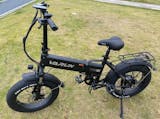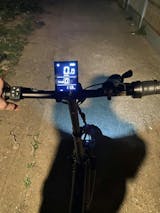Table of Contents
- 1. Introduction: Why City Commuting Electric Bikes?
- 2. What is a City Commuting Electric Bike?
- 3. Core Benefits
- 4. Riding Scenarios
- 5. Who Should Use a City Commuting Electric Bike?
- 6. Comparing with Traditional Bikes
- 7. Current Trends in Urban E-Bikes
- 8. FAQ: How to Choose the Best Electric Bike for City Commuting
- 9. Explore Varun Commuter E-Bikes
1. Introduction: Why City Commuting Electric Bikes?
City commuting can be stressful, time-consuming, and exhausting. With traffic jams, crowded public transport, and parking headaches, traditional commuting often feels inefficient. Enter the City Commuting Electric Bike. Combining speed, convenience, and eco-friendliness, it's transforming the way urban residents travel.
2. What is a City Commuting Electric Bike?
A city cruiser electric bike or commuter ebike is designed specifically for urban environments. It provides pedal assist or throttle power to make longer rides effortless. Unlike mountain or off-road bikes, city ebikes prioritize comfort, agility, and smooth handling for streets, bike lanes, and sidewalks.
3. Core Benefits
Riding a City Commuting Electric Bike offers several advantages:
- Speed & Efficiency: Reach work faster without breaking a sweat.
- Cost-Effective: Say goodbye to fuel costs and parking fees.
- Eco-Friendly: Reduce your carbon footprint compared to driving.
- Comfort: Upright seating and suspension options make rides enjoyable.
- Health Benefits: Pedal-assist lets you exercise without overexertion.
4. Riding Scenarios
City commuting e-bikes fit multiple scenarios:
- Daily Commutes: Breeze past traffic and get to work on time.
- College Campus: Cover campus distances quickly and comfortably.
- Weekend Trips: Explore city parks or nearby neighborhoods without strain.
- Errands: Easy to carry groceries or small packages with integrated racks.
5. Who Should Use a City Commuting Electric Bike?
City ebikes are perfect for:
- Urban professionals seeking fast, reliable commutes.
- Students covering long campus distances daily.
- Eco-conscious individuals reducing carbon emissions.
- Anyone looking to combine exercise with effortless city riding.
6. Comparing with Traditional Bikes
| Feature | Traditional Bike | City Commuting Electric Bike |
|---|---|---|
| Speed | Moderate, fully pedaled | Faster with pedal-assist or throttle |
| Effort | Full physical exertion | Reduced effort, easier hills & long rides |
| Commute Time | Longer in traffic | Shorter, more predictable |
| Cost | Low upfront, no battery | Higher upfront, saves on fuel/parking |
| Flexibility | Limited by rider stamina | Extended range and versatility |
7. Current Trends in Urban E-Bikes
Urban commuting is shifting. Rising fuel costs, traffic congestion, and sustainability trends make city ebikes more popular than ever. People want convenience, speed, and a greener lifestyle—commuter ebikes perfectly fit that demand.
8. FAQ: How to Choose the Best Electric Bike for City Commuting
- How to Choose the Best Electric Bike? Consider motor power, battery life, weight, comfort, and your daily route.
- What is a city cruiser electric bike? Designed for comfort and easy urban navigation with pedal assist and smooth handling.
- Are commuter e-bikes faster than regular bikes? Yes, they cover longer distances with less effort and quicker travel time.
9. Explore Varun Commuter E-Bikes
Ready to upgrade your city commute? Explore our Varun Commuter E-Bikes and discover the perfect city riding companion today.







Share:
What Is an E-Bike? Complete Guide for New Riders in 2025
Best Off-Road Electric Bike for Adults Under $700